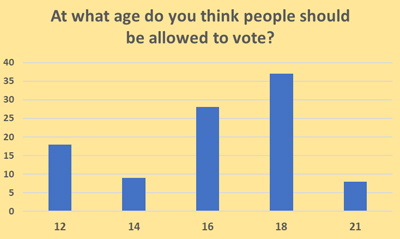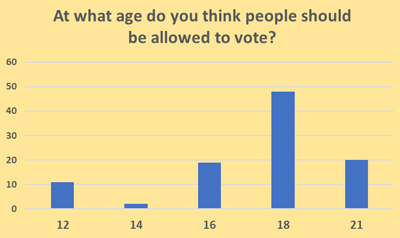Children’s Opinion on Voting Age
At What Age Do Children Think We Should Be Allowed To Vote?

There has been much debate of late on the issue of voting age. In Scotland 16-year-olds have been given the vote in local elections, and for the Scottish parliament. In the rest of the UK though it remains at 18.
All the major opposition parties intend to lower the voting age if they are elected. However, with the governing Conservative Party set against this, votes for 16-year-olds seems a far-off dream for the time being at least.
With this being such a hot topic we decided to find out what children think. At what age do they believe people should be allowed to vote? To get the answer we asked 1,494 schoolchildren the following question, “At what age do you think people should be allowed to vote?” We gave a choice of five possible answers: 12 years old, 14, 16, 18, or 21 (until 1970 this was the voting age).
Majority Want Voting Age Lowered
There was no clear winner in our poll. The largest share of the vote went to keeping things as they are. 37% of schoolchildren are happy with a voting age of 18. Lowering the voting age to 16 came second with 28%. Sounds like a clear victory for the status quo, until you take the other votes into consideration…
18% of our respondents wanted the voting age lowered to 12, ands 9% to 14. Adding that to the 28% who supported a change to the age of 16, a total of 55% of schoolchildren would support a lowering of the voting age. 8% of them would support raising the voting age to 21 which, combined with the 37% who want to keep it as is, makes 45%. A slim majority for lowering, but slim majorities are enough to change the future of countries – the Brexit referendum result is testament to that.
Adults Dead Against Lowering Voting Age

Out of curiosity we conducted the same poll on adults. As you can see, the results were very different. Just shy of half our respondents (48%) want to keep the current voting age, and quite a large portion (20%) actually want to go back to the pre-1970s and raise it. So, why would anyone be so against votes for younger adults? Let’s have a look at some of the pros and cons of votes for 16-year-olds:
Taxes
There is a famous slogan which accompanied the American rebellion against the British back in the 1700s: “No taxation without representation.” As things stand, people in the UK start to pay tax on their income when they are 16. This being the case, why are they denied a vote? Opponents of votes for 16-year-olds have no answer to this. The obvious one would be to be exempt from taxes until you are 18, but this has not been forthcoming.
Wisdom
Many opponents of votes for 16-year-olds cite lack of experience and worldly wisdom as a reason to withhold the vote. Youngsters do not know enough about the way the world works and so their votes would be ill-informed, they say. If this is the case, then why do we allow 16-year-olds to marry, to have sex, or to become a parent? Surely these are important decisions? If 16 is too young to vote then it should be too young to do the other things I listed too.
Politically Mature
Another argument against votes for 16-year-olds is that they have not yet formed their political opinions. There is another famous phrase, “Any man who is under 30, and is not a liberal, has no heart; and any man who is over 30, and is not a conservative, has no brains.” It is certainly true that, for the majority, their political views wander further to the right as they age. The results of another survey we did at the time of the 2019 General Election support that. A vast majority of children would have voted Labour, but their elders chose a Conservative government.
Consequences
A final argument in favour of lowering the voting age is that it is the younger generation who have to live with the consequences of their elders’ decisions, long after their elders have passed on from this world. Take the Brexit referendum as an example. It is well known that the elder voters were more likely to vote for Brexit and that younger ones were more likely to vote to remain in the EU. If 16 year-olds had been allowed to vote the result of the referendum would have been much different. However, long after the voters in their 60s, 70s and 80s who voted to leave have passed on, those aged in their teens, 20s and 30s, who voted to remain, will be left to deal with the consequences of Brexit which very few of them actually supported.
FASCINATING CHILDREN’S SURVEYSFull Results of our "At what age should we be allowed to vote?” Survey
Here are the results from the 1,494 children who answered our question "At what age do you think people should be allowed to vote?" The survey was conducted in the week ending 4th April 2021.
| At what age do you think people should be allowed to vote? | Percentage of Respondents |
|---|---|
| 12 | 18% |
| 14 | 9% |
| 16 | 28% |
| 18 | 37% |
| 21 | 8% |



